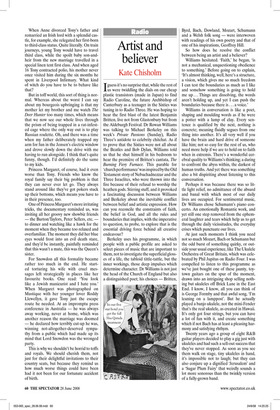Artist and believer
Kate Chisholm
Iguess it’s no surprise that, while the rest of us were twiddling the dials on our cheap plastic transistors (made in Japan) to find Radio Caroline, the future Archbishop of Canterbury as a teenager in the Sixties was tuning in to Radio Three. He was hoping to hear the first blast of the latest Benjamin Britten, live not from Glastonbury but from the Aldeburgh Festival. Dr Rowan Williams was talking to Michael Berkeley on this week’s Private Passions (Sunday), Radio Three’s antidote to celebrity chitchat. As if to prove that the Sixties were not all about the Beatles and Bob Dylan, Williams told us that he shut himself in his bedroom to hear the première of Britten’s cantata, The Burning Fiery Furnace. This parable for ‘church performance’ was inspired by the Old Testament story of Nebuchadnezzar and the Three Israelites, who were thrown into the fire because of their refusal to worship the heathen gods. Stirring stuff, and it provoked a fascinating discussion between Williams and Berkeley about the inevitable conflict between belief and artistic expression. How can you reconcile the constraints of faith, the belief in God, and all the rules and boundaries that implies, with the imperative to question, to probe, to explore that is the essential driving force behind all creative endeavour?
Berkeley uses his programme, in which people with a public profile are asked to select pieces of music that are important to them, not to investigate the superficial glosses of a life, the tabloid tittle-tattle, but the inner workings, those deep impulses which determine character. Dr Williams is not just the head of the Church of England but also a distinguished poet; his choices — Britten, Byrd, Bach, Dowland, Mozart, Schumann and a Welsh folk song — were interwoven with readings of his own poetry and that of one of his inspirations, Geoffrey Hill.
So how does he resolve the conflict between being an artist and a believer?
Williams hesitated. ‘Faith,’ he began, ‘is not a mechanical, unquestioning obedience to something.’ Before going on to explain, ‘It’s almost thinking, well, here’s a structure, a vision, which gives me so much freedom I can test the boundaries as much as I like and somehow something is going to hold me up ... Things are dissolving, the words aren’t holding up, and yet I can push the boundaries because there is ... a voice.’ Williams in conversation is like a poet, shaping and moulding words as if he were a potter with a lump of clay. Every sentence is qualified by the next, nothing is concrete; meaning fluidly segues from one thing into another. It’s all very well if you have the brain and hard drive of someone like him; not so easy for the rest of us, who need more help if we are to hold on to faith when in extremis. There’s a wonderful cerebral quality to Williams’s thinking; a daring to confront the abyss within, the darkest of human truths. And yet there was something also a bit dispiriting about listening to this conversation.
Perhaps it was because there was so little light relief, no admittance of the absurd and banal with which most of our daily lives are occupied. For sentimental music, Dr Williams chose Schumann’s piano concerto. An emotionally Romantic work, and yet still one step removed from the ephemeral laughter and tears which help us to get through the daily vicissitudes, the everyday crises which punctuate our lives.
At just such moments I think you need not so much Mozart, Bach or Schumann but the odd burst of something quirky, or outside your usual experience, like The Ukulele Orchestra of Great Britain, which was celebrated by Phil Jupitus on Radio Four. I was compelled to listen to this programme as we’ve just bought one of these jaunty, toytown guitars on the spur of the moment, drawn into an intriguing shop selling nothing but ukuleles off Brick Lane in the East End. I know, I know, all you can think of is George Formby and that awful song, ‘I’m leaning on a lamppost’. But he actually played a banjo ukulele, not the mini-Fender that’s the real ukulele, as created in Hawaii. It’s only got four strings, but you can have a lot of fun with it, and create something which if not Bach has at least a pleasing harmony and satisfying rhthym.
Twenty years ago a group of eight R&B guitar players decided to play a gig just with ukuleles and had such a sell-out success that they’ve never stopped. As soon as you see them walk on stage, tiny ukuleles in hand, it’s impossible not to laugh; but they can also conjure up a dignified ‘Jerusalem’ and a ‘Sugar Plum Fairy’ that weirdly sounds a lot more sonorous than the twinkly version of a fully-grown band.


















































































 Previous page
Previous page